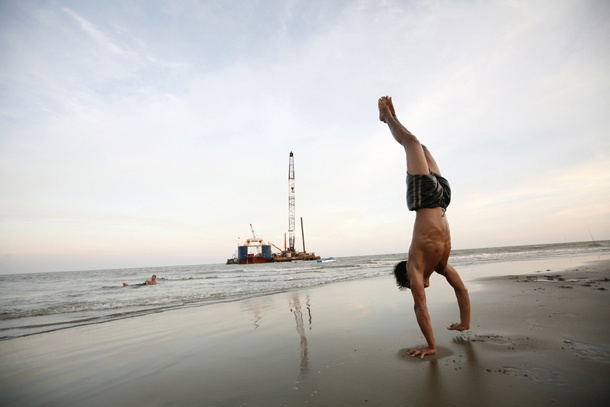An influx of foreign investment in Burma’s extractive industries is likely to fuel human rights abuses and environmental degradation across the country, unless “major shortcomings” in its legal and regulatory framework are addressed, a new report warned on Wednesday.
Burma’s laws and regulations are woefully lacking in human rights and environmental protections and laced with authoritarian provisions, which allow the government to arbitrarily seize land from farmers and ignore local concerns, according to the Shwe Gas Movement.
The advocacy group accuses President Thein Sein of taking “superficial steps towards reform”, while fuelling land grabs, civil war and a “flagrant disregard for the rule of law” in resource-rich ethnic minority areas.
The report calls on foreign investment to be “put to a halt” until serious regulatory reforms, including revenue sharing procedures, meaningful public consultations and genuine accountability mechanisms have been introduced.
“Burma’s constitution and legislation must not solely represent a centralised government, but simultaneously protect the people and environment of Burma,” warned the report, which was launched in Rangoon on Wednesday.
Burma currently has no laws requiring companies to conduct environmental and social impact assessments or to respect the principle of free, prior and informed consent – all of which are considered good practice standards by the international community. Even legislation introduced since the end of military rule legitimises arbitrary land confiscations by the state and stifles the right to protest, says the report.
“I think this is a warning, a cautionary reminder that the regulatory investment regime in Burma is in some places still very new and in others inadequate,” Paul Donowitz, Campaign Director of EarthRights International, told DVB. “The concern is that companies in the absence of regulation will rush in and they won’t abide by best practices because they are not required to.”
The report comes as work on the controversial pipeline, known as the Shwe Gas Project, which will pump oil and gas from western Burma’s Arakan state into China’s Yunnan province, draws completion.
Activists say the project, which is expected to earn the government US$1.8 billion annually, has caused wide-scale environmental destruction and land confiscations across ethnic minority territories, but will bring slight economic benefits to the local population.
“Many people have not received compensation yet,” Wong Aung from the Shwe Gas Movement told DVB, adding that the loss of local livelihoods, such as farming and fishing, is another concern. “Local people have been asked to sign a paper not to ask for any more compensation or land.
The China National Petroleum Corporation, which jointly operates the venture with Burma’s state-owned Myanmar Oil and Gas Corporation (MOGE), has reportedly donated around US$10 million to the government for local investments, but Wong Aung says no one knows how that money is being spent.
On his trip to the UK, President Thein Sein reiterated Burma’s commitment to join the Extractive Industries Transparency Initiative (EITI) – a global standard for disclosing payments and revenues around natural resource extraction. But the report warns that Burma has only fulfilled two out of five sign-up requirements to reach candidate status.
Notably, Burma has failed to develop an inclusive multi-stakeholder working group encompassing civil society and ethnic minority representatives. “It’s very important to include stakeholders from ethnic communities in the discussions,” said Wong Aung. “Unfortunately the state government has been rushing into EITI, so I don’t think we have much time to build meaningful participation of civil society.”
Burma is due to announce the winners of a highly anticipated off-shore oil and gas block tender sometime this month. Although information about the bids, which were launched in April and attracted considerable western interest, were “fairly transparent”, according to Donowitz, the details are still opaque.
“None of the bids have been disclosed, it’s to be determined who get’s the contracts, whether they will go to the best bidder or whether it will be down to insider connections,” he said.
But he added that Burma’s interest in joining EITI means that payments made by companies and payments received by the notoriously secretive regime would likely be disclosed for the first time.
Burma, which is emerging from nearly five decades of military rule, is rich in gems, industrial minerals, oil, and offshore natural gas reserves estimated at 10 trillion cubic feet. But most of the country’s natural resources are found in its volatile ethnic minority regions, including Shan and Kachin states, where violence continues to flare near areas slated for large-scale development projects.
The former pariah was recently ranked the least transparent country in the world by an international study examining natural resource governance. According to the report, Burma “performed extremely poorly” across all indicators, citing a prolific lack of transparency and accountability.



